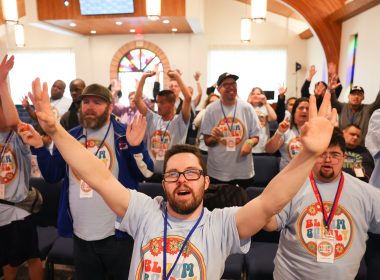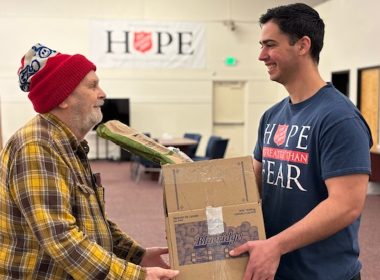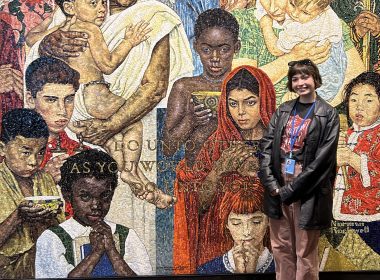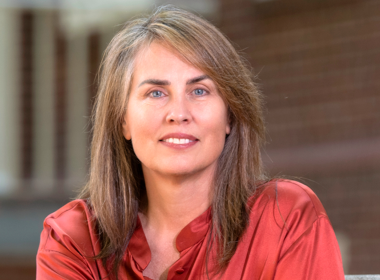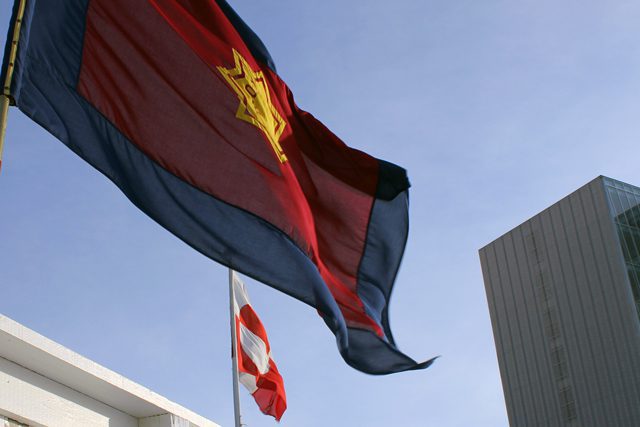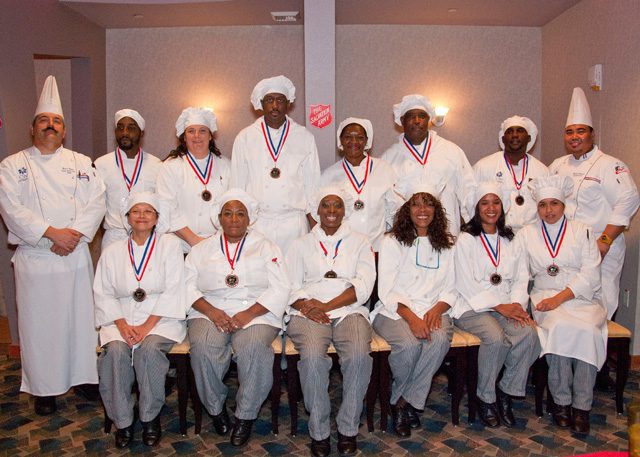Danish officers establish The Salvation Army in Greenland.
By Levi Giversen, Major –
The first premises quickly became too small for The Salvation Army in Nuuk, Greenland, so its activities now take place in a new house that is twice the size. However, for Lts. Petura and Magnus Haraldsen, the church is much more than a building. Reassigned to appointments in Denmark this summer, the couple will miss the people in Greenland the most.
[ezcol_2third]From the Danish town of Nakskov to the Greenlandic capital Nuuk is a long way, but for Lts. Petura and Magnus Haraldsen this was simply a continuation of their call to be Salvation Army pioneers. And when they left the Greenlandic capital to take up new appointments in Denmark, a historic chapter came to an end.
Until three years ago, The Salvation Army was a blank page in Greenland. Despite massive spiritual and social needs, the Army’s flag was not yet planted in the biggest island in the world—located in the polar belt of the North Atlantic Ocean.
The lack of arctic Salvation Army representation had long called for a breakthrough. Fortunately, this call did not go unheeded. Almost in competition with the region’s melting ice caps, the last resistance to the Army’s move into Greenland thawed three years ago. Fruitful meetings between Salvation Army leadership in Denmark and Greenlandic authorities at the beginning of 2012 were decisive, and in August of the same year, the Army was ready to “invade.”
Without hesitation
At the Salvation Army training college in Norway, then-Cadets Haraldsen were in the final stage of their studies. As officers-to-be, they expected in the coming summer to continue their 15 years of pioneer work in the southerly Danish town of Nakskov, where they had been in charge of a corps, a shelter and a center for second-hand clothing.
That is until they received an unexpected phone call from the then territorial commander in Denmark, Colonel Birgitte Brekke, which turned their minds more than 1,860 miles further north.

“We need to think and pray about that” was the couple’s immediate reaction when asked about pioneering the Army’s work in Greenland. The challenge caused neither hesitation nor doubts in their minds. Both said they experienced a clear “yes and amen” in their inner self.
And so, at a Danish Salvation Army congress a few months later, the pair together with their teenage sons, Dániel and Andrias, received their formal marching orders from then-General Linda Bond (Ret.).
[/ezcol_2third] [ezcol_1third_end]
Changing Leadership in Greenland
After 15 years’ pioneer work for The Salvation Army in Nakskov, a town in a poor area of Denmark, Petura and Magnus Haraldsen were accepted as officers-in-training at the Salvation Army training college in Norway.
After their commissioning and ordination, they were appointed to establish The Salvation Army in Nuuk, Greenland, in 2012. During the past year, the Hardalsens have been assisted by Lt. Martin Mader Jensen.
The Haraldsens concluded their time in Greenland in August, appointed to new responsibilities in Odense, the third largest town in Denmark. Jensen will also return home to Denmark, taking up an appointment in a corps in Aalborg.
The new leaders in Greenland are Majors Kurt and Helle Pedersen, and since August the Denmark Territory is now the Denmark and Greenland Territory.
[/ezcol_1third_end]

Many miles of prayer
The family settled in the little capital city with houses in all the colors of the rainbow, fringed with snow-covered mountains and a never-ending view of the sea, and time flew by.
“We can’t understand where the time has gone,” they said, recalling their first impressions and initiatives in what is the 125th country The Salvation Army chose to enter.
The Haraldsens’ first year in Greenland was marked by one persistent activity across the city’s wintry and windswept streets.
“Two days a week, we went prayer-walking,” they explained. “We walked where God led our steps, often passing through locations such as the self-government’s head office, local authorities and educational institutions.”
The couple is convinced that the progress and growth of the Army in Greenland can be directly attributed to this spiritual preparatory work.
“If we had advanced differently, we would surely have ended up somewhere else,” Magnus said.

Signs of growth
The Army’s corps premises in Nuuk was opened in February 2013, but soon proved too small for the Army’s growing work. A new house, twice the size of the first, was acquired in May this year.
This new house is a definite answer to prayer, fulfilled by a much-appreciated donation from The Salvation Army’s USA Western Territory, which is a “partner in mission” with The Salvation Army in Denmark. Its territorial leaders, Commissioners James and Carolyn Knaggs, presented this generation donation during a visit to Greenland earlier in the year.
One of the Haraldsens’ final tasks before returning to Denmark was to prepare the new house for the officers replacing them.
But the couple still remember the early days when their tiny house first began filling with people. “We opened our doors for the first time in February 2013, and already in May, we had a full house,” Magnus said.
“We opened a café, which was followed by other initiatives, such as a night church, Bible study, prison service and later a soup kitchen, in partnership with the Red Cross and a local relief organization.”
Their target group turned out to primarily consist of homeless and other marginalized people.

Many ambassadors
For the Haraldsens, their congregation reminds them that the church is never just a building made of dead stones, but a congregation built of living stones—–individuals whose lives they have seen transformed and restored.
“It’s quite astounding,’ Magnus said. “In the beginning there were only four people at the café meetings, and we are now close to 40.” And while he says the “eating part of the meeting” was a major attraction in the beginning, it is primarily “spiritual food” that is the most sought after today. “We experience a large influx whenever we meet for Bible study and prayer. And we can clearly see people’s spiritual growth,” he said.
Much of their congregation live in shelters or even on the streets, and Petura said the fellowship they enjoy at the Army is a direct contrast to the lives they would otherwise be living. “It brings smiles back on their faces and life in their eyes, in contrast to the sad and blank looks one can meet in settings like the shelter. At the Army, they are met with a loving atmosphere and are uplifted in their spirit,.” she said.
So far only a few in the congregation have become Salvation Army members.
“We only have a few members…but we have many ambassadors,” Petura said. “We don’t need to advertise much because the invitation to come is passed by word of mouth.”
Currently, their corps has four adherent members, all of whom have been enrolled during the past year.

Walking companions
Just as Petura and Magnus Haraldsen have left imprints on the beautiful country known by its Inuit citizens as “Kalaallit Nunaat”—–”the Land of Man”—–Greenland and its inhabitants have also left deep imprints on the Haraldsens.
“We will remember their mentality, their mindset, their deep respect for the spiritual dimension, and their humbleness,’ Magnus said. Petura continued, “These are people who live close to nature and the force of nature. I think that makes them more humble. They dare to acknowledge their limitations.”
The couple honor God that their service has been fruitful in the Greenlandic community. “One feels very small here,” Petura said. “But we have found help in our faith and always put our trust in the Lord, who has been faithful!”
Magnus agreed, adding, “Most of all, I feel that I have been a companion who has had the privilege of walking alongside these people—–I have seen how God has worked in their hearts and transformed their lives.”
The couple made no secret of the fact that three years far away from home has been challenging on a personal level. Yet, they found it hard to leave this chilly country with its warm-hearted people. “It’s not easy to say goodbye,” Petura said. “It seems like leaving a child that you have watched grow up. But we must hold on to the essential truth: this is God’s project, not ours.”
Magnus added, “And we must hold on to what our task in Greenland was, to be pioneers who came to start a new work for God.”


